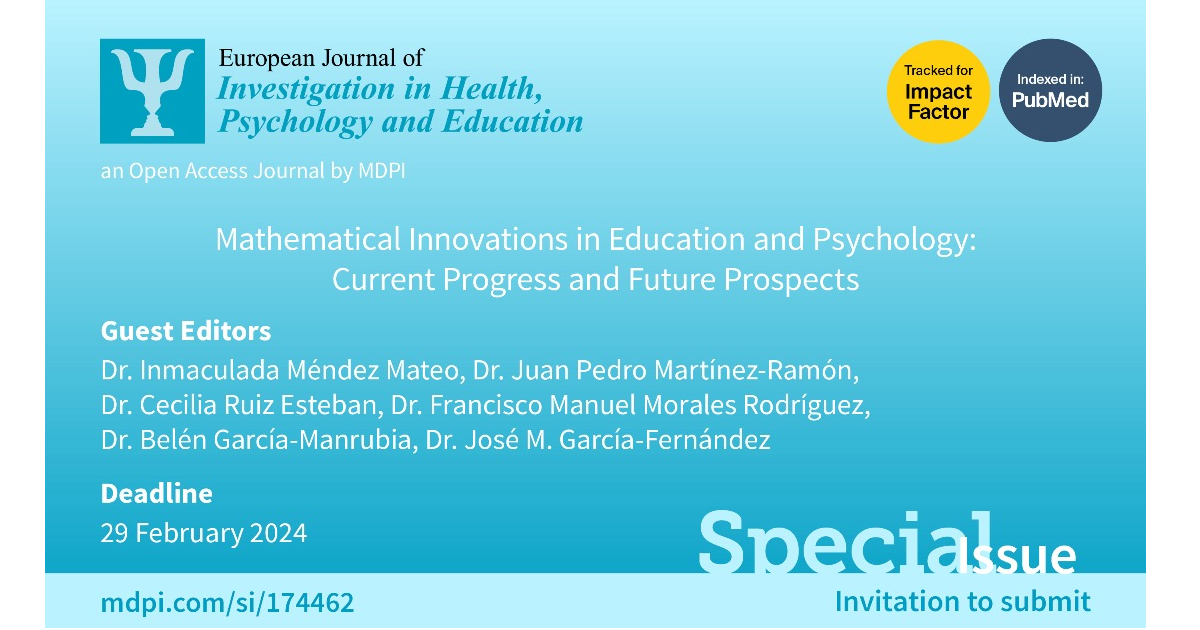Mathematical Innovations in Education and Psychology: Current Progress and Future Prospects
A special issue of European Journal of Investigation in Health, Psychology and Education (ISSN 2254-9625).
Deadline for manuscript submissions: closed (29 February 2024) | Viewed by 2583

Special Issue Editors
Interests: bullying; cyberbullying; coexistence; education; university; attention to diversity; older adults
Special Issues, Collections and Topics in MDPI journals
Interests: coexistence; attention to diversity; bullying; burnout; coping strategies; stress; social skills; artificial neural networks; educational psychology
Special Issues, Collections and Topics in MDPI journals
Interests: bullying; cyberbullying; school violence; education; university; attention to diversity
Special Issues, Collections and Topics in MDPI journals
Interests: educational psychology; coping strategies; daily stress; academic engagement; generic competences; affective–sexual diversity; prosocial behaviour; social skill
Special Issues, Collections and Topics in MDPI journals
Interests: education psychology
Interests: school anxiety; perfectionism; school refusal; affect; validation; cluster analysis; factorial invariance
Special Issues, Collections and Topics in MDPI journals
Special Issue Information
Dear Colleagues,
Research in the fields of education and psychology has shown that both teachers and the family context play crucial roles in mathematics education. However, many students face difficulties managing the affective dimension, such as negative attitudes, low motivation, or anxiety, which can lead to negative consequences, such as frustration and lack of interest in the subject. Therefore, understanding the numerous factors that affect the teaching–learning process is key to attaining proper educational attention. In mathematics education, different aspects must be taken into account, such as teacher training, the needs and difficulties of students, including possible psychopathologies such as anxiety or phobias. Further research is needed in both psychology and education to improve the teaching and learning of mathematics, including prevention and intervention programs. Key areas for research include exploring the affective dimension of mathematics education, the role and attitudes of families, and investigating teacher training, instrument construction, and teaching strategies.
Dr. Inmaculada Méndez Mateo
Dr. Juan Pedro Martínez-Ramón
Dr. Cecilia Ruiz Esteban
Dr. Francisco Manuel Morales Rodríguez
Dr. Belén García-Manrubia
Dr. José M. García-Fernández
Guest Editors
Manuscript Submission Information
Manuscripts should be submitted online at www.mdpi.com by registering and logging in to this website. Once you are registered, click here to go to the submission form. Manuscripts can be submitted until the deadline. All submissions that pass pre-check are peer-reviewed. Accepted papers will be published continuously in the journal (as soon as accepted) and will be listed together on the special issue website. Research articles, review articles as well as short communications are invited. For planned papers, a title and short abstract (about 100 words) can be sent to the Editorial Office for announcement on this website.
Submitted manuscripts should not have been published previously, nor be under consideration for publication elsewhere (except conference proceedings papers). All manuscripts are thoroughly refereed through a single-blind peer-review process. A guide for authors and other relevant information for submission of manuscripts is available on the Instructions for Authors page. European Journal of Investigation in Health, Psychology and Education is an international peer-reviewed open access monthly journal published by MDPI.
Please visit the Instructions for Authors page before submitting a manuscript. The Article Processing Charge (APC) for publication in this open access journal is 1400 CHF (Swiss Francs). Submitted papers should be well formatted and use good English. Authors may use MDPI's English editing service prior to publication or during author revisions.
Keywords
- mathematics teaching
- teacher training
- psychopathology
- mathematics
- motivation
- emotions
Benefits of Publishing in a Special Issue
- Ease of navigation: Grouping papers by topic helps scholars navigate broad scope journals more efficiently.
- Greater discoverability: Special Issues support the reach and impact of scientific research. Articles in Special Issues are more discoverable and cited more frequently.
- Expansion of research network: Special Issues facilitate connections among authors, fostering scientific collaborations.
- External promotion: Articles in Special Issues are often promoted through the journal's social media, increasing their visibility.
- e-Book format: Special Issues with more than 10 articles can be published as dedicated e-books, ensuring wide and rapid dissemination.
Further information on MDPI's Special Issue polices can be found here.











